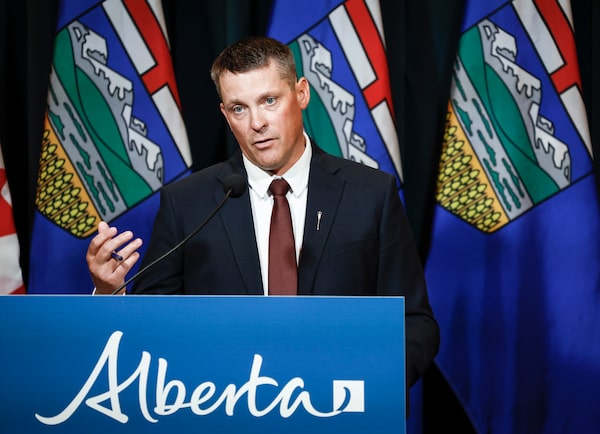
Alberta Finance Minister Nate Horner speaks at a news conference in Calgary on June 29.Jeff McIntosh/The Canadian Press
As Alberta enters the fourth year of debate over whether to ditch the Canada Pension Plan, the Opposition NDP says Premier Danielle Smith’s government is dragging its feet in order to sway the outcome.
NDP house leader Christina Gray says the United Conservative Party government has failed to release a long-promised third-party analysis of quitting CPP because it is busy doctoring the report to make the case for Alberta going it alone on pensions.
“We all know that the UCP is obsessed with meddling with Alberta’s pensions and pulling out of the CPP,” Ms. Gray told reporters Monday.
“The [third-party] report the UCP mentions has been trapped in the minister’s office since 2021. What kind of biased rewriting has it been going through?”
Ms. Gray said opinion polls suggest ditching CPP is deeply unpopular in Alberta while studies conclude it would be highly volatile and potentially catastrophic.
But she said Ms. Smith continues to pursue it just to thumb her nose at the federal government.
“I believe that they’ve continued along this path, because they find political benefit of fighting with Ottawa and being angry,” Ms. Gray said.
“Every single independent analysis of this idea has proven that pulling Alberta out of the CPP will cost more and give less to Albertans while also destabilizing pension security here in Alberta and across Canada.
“It will risk Albertans’ (pension) benefits for no good reason.”
Last week, Ms. Smith, in her mandate letter to Finance Minister Nate Horner, directed him to release the report, followed by “consulting with Albertans on its findings to determine whether a referendum should be held to establish an Alberta Pension Plan that will increase pension benefits for seniors, reduce premiums for workers and protect the pension interests and benefits of all Albertans.”
Mr. Horner declined Monday to give a rollout time frame.
“My job now is to do the work, report the findings back to the premier and my colleagues, and then have a fulsome conversation on these topics with Albertans,” he said in a statement.
“With regard to the Alberta Pension Plan, the NDP are creating fear where it is unwarranted. We’re awaiting the final draft of the report, and it would be a shame if Albertans didn’t get a chance to see the findings and understand the potential possibilities.”
Finance Department spokesperson Charlotte Taillon said the third-party report is being done by Lifeworks, formerly known as Morneau Shepell, which helps companies with employee and family assistance plans, absence management, pension and benefits administration, and retirement planning.
A year ago, Telus Corp. signed a deal to buy LifeWorks for $2.9-billion, including debt.
The issue of Alberta going it alone on pensions has blown hot and cold for the last two decades amid concerns Alberta puts in far more than it gets out of the plan and may benefit from a standalone benefit program such as in Quebec.
The current UCP government began studying the Alberta option in earnest in June, 2020, under then-premier Jason Kenney. Later that year, the outside consultant was hired to study the benefits and drawbacks.
In March, 2021, Mr. Kenney said work on the report was almost done and his government was just weeks away from announcing next steps. The report never materialized.
In February, Ms. Smith’s office said the report was being updated to reflect new figures on the CPP.
Ms. Taillon said Monday that this update work continues.
“Near the end of the calendar year 2022, the Office of the Chief Actuary of Canada tabled updated asset figures for the CPP, and LifeWorks required additional time to update the report based on these new figures,” Ms. Taillon said. “When the final report is ready, it will be released to the public thereafter.”
Ms. Smith and Mr. Kenney have both extolled the potential of a go-it-alone program, given Alberta’s wealth and comparatively young population.
Should it take steps to exit the CPP, Alberta would be trailblazing new territory given that Quebec did not exit the plan, but rather didn’t join it when the CPP was created in the mid-1960s.
Analysts, however, say risks and rewards come with many unknowns that would change, and change drastically, depending on shifts in Alberta’s economy and demographics, along with the policies and priorities of the government of the day.